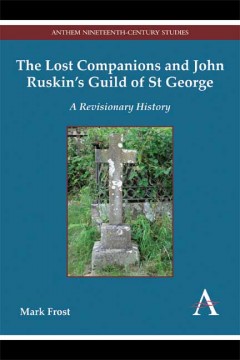This major work in Ruskin studies offers a timely re-evaluation of the origins, formation and workings of John Ruskin’s Guild of St George. Drawing on both significant and recently discovered archive material and existing research, this work looks afresh at the genesis of Ruskin’s ideas and their translation into practice.
Since Ruskin criticism began, attention has been drawn to the Guild of St George, Ruskin’s attempt in the 1870s and 1880s to foster a series of self-sufficient, co-operative agrarian communities founded on principles of artisanal (non-mechanised) labour, and creativity and environmental sustainability. While endorsing previous accounts which point to the positive impact of Ruskin’s Guild, this book tempers such readings by considering the often destructive effect of Guild life on the Companions who worked in the communities. An astonishing wealth of previously unpublished correspondence reveals the extent to which Ruskin’s ideological position caused a failure to translate well-meaning idealism into effective social action, and often devastating consequences for those who worked St George’s land. By drawing on entirely new material, it is possible to reveal in detail for the first time the realities of Guild life over an extended period of time. This monograph provides an authoritative work on Ruskin’s utopian experiment, enriching ongoing discussions on sustainable community and bringing Ruskin’s work to a wider audience.
‘This is an exceptionally important book which is startlingly original in its historical inquiry. The recovery of the “lost Companions” reveals a sharply different story that will have major significance for understanding Ruskin’s political work.’ —Francis O’Gorman, University of Leeds
‘Deftly using a wide range of often unfamiliar or previously unknown sources, Frost completely rewrites the history of Ruskin’s Guild. Meticulously researched, this study recuperates the role played by early Companions in attempting to realise on the ground the fertile ideas Ruskin was articulating in his books and exposes the damaging gulf that increasingly separated the Master from his disciples.’ —Stuart Eagles, author of ‘After Ruskin’
‘In a series of extremely well-written chapters, and using a wealth of material missed by those who have written about it previously, Mark Frost reveals the story of the Guild of St George. In the end, it is a tragic story, but a vitally important one for Ruskin studies, for Victorian studies, and for anyone interested in how the sometimes awful costs of good intentions come into being. It is a major contribution.’ —James Spates, Hobart and William Smith Colleges, Geneva, New York
‘The history of the Guild of St George, conceived by Ruskin in 1871 to promote education, handicraft and land use (and still flourishing today), has never been explored in depth. This absorbing book based on new research tells the story of its early years, filled with dreams, disputes and fascinating characters.’ —Stephen Wildman, Director of the Ruskin Library and Research Centre, Lancaster University
‘This is an exceptionally important book which is startlingly original in its historical inquiry. The recovery of the “lost Companions” reveals a sharply different story that will have major significance for understanding Ruskin’s political work.’ —Francis O’Gorman, University of Leeds
‘Deftly using a wide range of often unfamiliar or previously unknown sources, Frost completely rewrites the history of Ruskin’s Guild. Meticulously researched, this study recuperates the role played by early Companions in attempting to realise on the ground the fertile ideas Ruskin was articulating in his books and exposes the damaging gulf that increasingly separated the Master from his disciples.’ —Stuart Eagles, author of ‘After Ruskin’
‘In a series of extremely well-written chapters, and using a wealth of material missed by those who have written about it previously, Mark Frost reveals the story of the Guild of St George. In the end, it is a tragic story, but a vitally important one for Ruskin studies, for Victorian studies, and for anyone interested in how the sometimes awful costs of good intentions come into being. It is a major contribution.’ —James Spates, Hobart and William Smith Colleges, Geneva, New York
Mark Frost is a Senior Lecturer at the University of Portsmouth. He received his PhD from the University of Southampton.
Anthem Nineteenth-Century Series
List of Illustrations; Preface; Frequently Cited Sources; Introduction; I. Roots; II. Glimpsing Eden: 1867–70; III. ‘At Least A Beginning’: 1871–75; IV. Opportunities: 1875–77; V. Dreams and Nightmares: 1878–81; VI. The Long Decline and the Great Dispute: 1882–1900; Afterword; Appendix; Notes; Bibliography; Index
No links for this title.
No Podcasts for this title.



